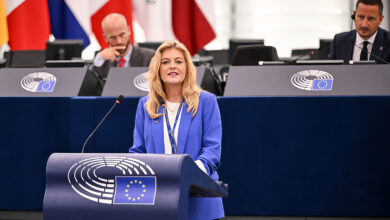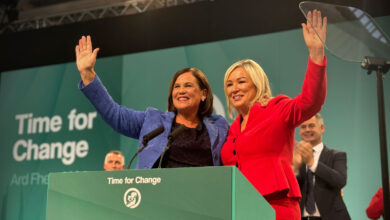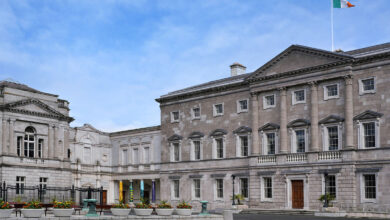Minimum alcohol pricing
 For:
For:
Fiona Ryan, Director
Alcohol Action Ireland
Cheap alcohol in Ireland is fuelling a crisis that is costing us over €3.7 billion a year in health, crime, public order and ancillary costs. The Government is in the dubious position of being both debtor and creditor in this exchange. It makes around €2.2 billion a year from alcohol but this figure is surpassed by how much it has to spend metaphorically cleaning up at the end of the night.
The Government has a range of options. It could ignore the inconvenient truth by tinkering at the edges but not doing anything that would actually impact on consumption levels i.e. any market based policy initiative. Or it could take on board World Health Organisation analysis: to reduce alcohol-related harm, we need to reduce consumption, to reduce consumption then we have to tackle pricing, availability and marketing.
Talking about alcohol being available at “pocket money” prices is not an exaggeration. The reality in the supermarket aisle is that alcohol can be cheaper than the bar of chocolate in the same store. A woman can reach her low risk maximum weekly drinking limit for €7 and a man for under €10. What these figures show is that alcohol in Ireland, despite relatively high taxes, is highly affordable. This fact was borne out by the 2009 RAND report on alcohol affordability which showed that alcohol in Ireland is 50 per cent more affordable that it was in 1996.
So what is minimum pricing? Minimum pricing sets a floor price beneath which alcohol cannot be sold and the price is set according to the amount of alcohol contained in the drink. If the alcohol being sold is already at the minimum price then there is no need for the price to increase. Minimum pricing impacts on the heaviest and youngest drinkers since they tend to choose the cheapest alcohol. Moderate drinkers should experience little effect. The challenge will be to set a minimum price that has relevance in an Irish context.
Some commentators have suggested that taxation is a better solution than minimum pricing because it effectively guarantees profits for the supermarkets. Taxation versus minimum pricing is a false dichotomy. Supermarkets can absorb tax increases on alcohol and pass those increases on to other goods while still allowing alcohol to be sold as a loss leader. In other words, nappies end up subsidising slabs.
Unsurprisingly, the alcohol industry is against minimum pricing. Up until recently the industry rejected any link between alcohol and pricing as influencing consumer behaviour. It then changed tack and now the arguments against minimum pricing include: provide more education. Unfortunately, the WHO evidence does not support the assertion; neither would common sense. What national government education initiative could compete with the almost É70 million spent on alcohol marketing in Ireland alone?
There is no magic ‘one size fits all’ solution to alcohol-related harm. Modelling exercises show that
minimum pricing will have beneficial effects while a minimum pricing initiative operating in some Canadian provinces are working. What we need is a raft of effective measures that target the market. Setting a floor price for alcohol is a good start.
 Against:
Against:
Dermott Jewell, Chief Executive
Consumers’ Association of Ireland
Not wishing to take away from the positivity behind it, but the suggestion or belief that increasing the price of alcohol will have the effect of significantly reducing the demand for it, from any age group, is simplistic in the extreme.
Factors for consideration must include how much a consumer either desires, needs or likes that item before price can be brought into the equation. Yes, you could raise the price by 50 per cent or more and it will have some effect, but not necessarily the desired or expected one.
Those who drink responsibly will be significantly affected, penalised unnecessarily and likely put to the point where they decide to actually boycott the product in that form. Those who drink excessively are likely to either opt to change the quality of the brand of beverage they favour or move from a spirit to wine or beer. Worse, they can look at alternatives such as illegally produced alcohol.
Alternative solutions to counteract the initiative must be focussed upon with concern. When smoking became decidedly more costly, the problem was addressed by the criminal element who sought to fill both their pockets and a gap in the market with dangerous counterfeit tobacco products. Alcohol is easier to produce for personal consumption. For years consumers have been proud of their beer-and wine-making abilities – and at little cost. Is it to be the case that a home brewing household charge will be introduced to counteract excesses here?
Regardless of whether it is or not, younger drinkers will be targeted by criminally minded producers of illegally produced alcohol because there will be a significantly increased demand for it.
When we abolished the Groceries Order, we lifted the ban on below cost selling. This has, undoubtedly, presented the opportunity for supermarkets to sell certain alcoholic beverages at cost or below. It is argued that this has had a devastating effect on pubs. Here, I will agree with the Minister; it was not price that drove many thousands of consumers out of the pubs, it was over-pricing. If the wishes of the Minister are to have any success in this area, changes here must be managed without increasing the price as a whole. I say this because the Vintners Federation of Ireland stated their support of the Minister’s initiative, not to reduce alcohol consumption in general, but because they saw it as a way of increasing their sales.
Parental responsibility is the biggest elephant in the room as they are the ones who are funding underage drinking and who will continue to do so at any price until they are given an incentive and an understanding of how and why they should stop.
This is an issue with an exhausting array of factors, therefore necessitating a multi-faceted comprehensive approach. Ireland has a problem and the Minister is to be applauded for attempting to tackle it. I contend that a one-size-fits-all price increase will not come even near to resolving it. Worse, I would see it as a measure that will determine the resolve of many to beat it.





